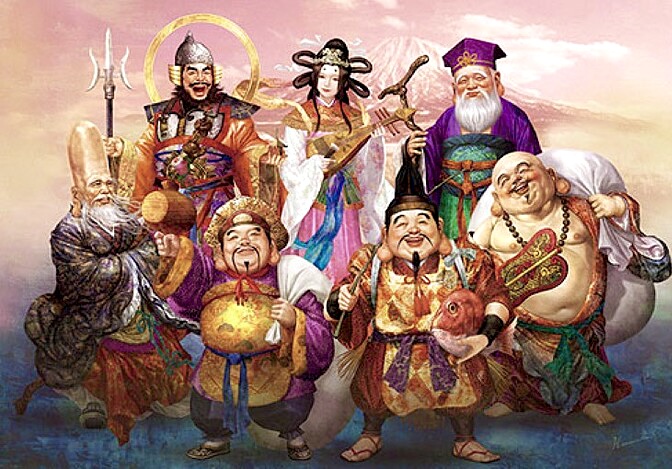https://thesapienshop.com/products/the-seven-lucky-gods
Copies Available: 77
Japan. A country of high technology, order, discipline and ancient beliefs and traditions. Images of the 7 gods of happiness are found literally at every step in Japan, many centuries each of the Seven is worshipped by a huge number of people. It is one of the most common lucky charms.
“The Lucky Gods” travel together on the ship of fortune, the Takarabune. The ship is laden with treasure, and on its sail you can often see the Chinese character “baku”, denoting the mythical animal that takes away nightmares. They are ready to endow any encounter with happiness and help even with the most mundane and everyday requests. It is not easy to meet them, as there are many who wish to find happiness.
Takarabune is a treasure ship loaded with gold and rice, wisdom and longevity, health, and good luck.
Until the Japanese merged them into one group, each of the seven deities led an independent existence. It is not known when the idea of this unification came about. It is believed that it happened in the Muromachi period (1392-1568) under the influence of extremely popular in China stories about the seven wise men of the bamboo grove. Another version is that the group originated in the famous Buddhist sutra “'Shichinan Sokumetsu Shichifuku Sokushō 七難即滅 七福即生” which can be translated as “seven troubles will disappear, and seven fortunes will arise.”
In the 17th century, the worship of the community of seven gods developed. The Japanese military ruler Tokugawa Ieyasu, after destroying all his enemies, coming to the coveted power, getting everything a mere mortal could dream of, apparently did not feel like a happy man. He commissioned his spiritual director, the monk Tenkai, to “catch happiness by the tail,” namely, to define the feeling. Tenkai formulated seven kinds of happiness: according to the Japanese Buddhist Statuare, these are justice, material well-being, benevolence, generosity, fame, long life, and dignity. Each of the seven gods was assigned the role of symbolizing these benefits.
The Japanese, like much of the rest of the world, regard the number seven as magical.
Specifics:
Ebisu 恵比須
Origin = Japan.
Shinto Name: Kotoshiro-nushi-no-kami
God of the Ocean, Fishing Folk, Good Forture, Honest Labor, Commerce. Virtue = Candor, Fair Dealing
Holds a fish (TAI, sea bream or red snapper), which symbolizes luck and congratulation (Japanese word for happy occasion is omede-TAI); fishing rod in right hand; folding fan in other; grants success to people in their chosen occupations; son of Daikoku. Popular among fishing folk, sailors, and people in the food industry.
Daikokuten 大黒天
Origin = India.
Skt. = Mahakala
Intro to Japan 9th C. AD
God of Earth, Agrculture, Farmers, Wealth, Prosperity, Flood Control, The Kitchen. Virtue = Fortune
God of five cereals; rice bales; treasure sack (bag); magic mallet in right hand; sometimes wears hood; rat (found around food); often shown with Ebisu, who is said to be his son; merged with Shinto deity of good harvests, Okuninushi no Mikoto. Also a member of the TENBU. Popular among farmers, agricultural businesses, & traders.
Benzaiten 弁財天
Origin = India.
Skt. = Sarasvati
Goddess of Music, Beauty, Eloquence, Literature, Art. Virtue = Amiability
Japanese mandolin, lute, magic jewel, snake, sea dragon. Only female among the seven. Member of the TENBU grouping. Popular among artists, musicians, and writers.
Hotei 布袋
Origin = China.
Chn. = Putai, Budai
Chinese Sage.
Budaishi (Jp. = Fuudaishiten)
God of Contentment and Happiness. Virtue = Magnanimity
Bag of food and treasure that never empties; oogi (fan), small children at his feet; supposedly only member of seven based on actual person (although Jurōjin / Fukurokuju might also be based on real person); known as the Laughing Buddha; rubbing his stomach is said to bring good luck; incarnation of Bodhisattva Maitreya (Jp. = Miroku). Popular among bartenders and all classes of people. Best known of the seven outside Japan.
Fukurokuju 福禄寿
Origin = China.
Taoist Hermit Sage
God of Wealth, Happiness, Longevity, Verility, and Fertility. Virtue = Popularity
Huge elongated head; long white beard, cane with sutra scroll, crane, deer, stag, tortoise (symbols of longevity); scroll said to contain all the wisdom in the world; said to inhabit same body as Jurōjin (the pair are two different manifestations of the same deity); wields power to revive the dead. Popular among watchmakers, athletes, others.
Jurōjin 寿老人
Origin = China. Identified with Laozi (Jp. = Rōjinseishi), the founder of Chinese Toaism
God of Wisdom & Longevity. Virtue = Longevity.
Also spelled Jurojin.
Long white beard, knobbly staff with scoll of life attached; tortoise, deer, stag, crane; in same body as Fukurokuju (the pair represent two different manifestations of the same deity); scroll said to hold the secret to longevity; sometimes carries a drinking vessel, as he reportedly loves rice wine (sake). Popular among teachers, professors, and scientists.
Bishamonten 毘沙門天
Origin = India.
Skt. Vaisravana.
God of Treasure, Bringer of Wealth, Defender of the Nation, Scourge of Evil Doers, Healer of Ilness. Virtue = Dignity
Wears armor, carries spear and treasure pagoda; centipede is messenger; Vaisravana in Sanskrit; also known as Tamonten (the commander of the Shitenno or Four Heavenly Kings), and a member of the TENBU Popular among soldiers, doctors, and certain Buddhist monestaries; the only member of the Shitenno worshipped independently.
Another beautiful creation gifted to us by @Dreamweaver and @Ugninis

 !
! !
!





